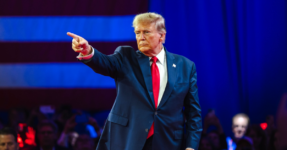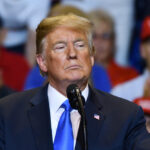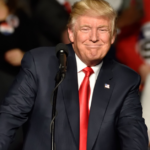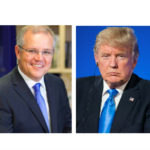The Potential Impact of Trump’s Election on Civil Liberties in the US and Abroad

It may have seemed far-fetched in 2016 that a demonstrably misogynist, racist, and sexist man who defrauded and destroyed many in the past during his failed business ventures, many of which ended up in bankruptcy, to be voted as the next President of the United States.
But with the assistance of Russia’s criminal hacking and propaganda, which was propagated on social media platforms such as Facebook, Trump won out against Hilary Clinton and steered a once-promising country to a future filled with division and hatred, and failed relationships with other countries.
Now, we are facing the same problem. Somehow, yet again, Trump was the Republican candidate elected by the political party — and he has been voted into office as the President of the United States. And now, the country, and the world, has to brace for the huge fallout now that this hateful dictator is in office.
Licence to Advance His Own Interests at the Expense of Civil Liberties
With Trump elected as the next President, there are concerns about encroachments on civil liberties for every citizen of the United States — and especially marginalised and minority communities.
The dictator-like leader has been extremely vocal about the potential for mass deportations, restrictions on female rights, legal protections for members of the LGBTQIA+ community, the media’s right to publish and individual liberties that do not align with his interests and those of other wealthy people and companies.
Let’s look at the amendments and how this Trump win could severely impact American democracy.
First Amendment – Free Speech
Concerns regarding free speech, which is protected by the first amendment to the US constitution, stem from Trump’s explicit contempt for media organisations that refuse to push his lies.
It might be noted that Fox News in the US had to pay over US $800 billion for spreading lies that Trump had won the 2020 election, and is Trump’s favoured news source as it continues to spread the president elect’s mistruths, albeit now attempting to temper this by routinely stating disclaimers.
Trump has continued to routinely label many other media organisations, as well as virtually anyone else that opposes or criticises him – as ‘fake’ and ‘enemy’ of the people, even recently stating he would have no issue with an attempted assassin shooting at him from behind journalist, implying this would cause their deaths.
The president elect has consistently attacked free press regardless of whether its coverage is verifiably accurate – which should be of considerable concern to all.
Second Amendment – Right to Own Firearms
Trump has reduced background check requirements for potential gun owners who have a diagnosed mental illness, along with allowing gun shops to remain open during the height of the COVID-19 pandemic.
His pro-firearm stance raises issues regarding what this could mean regarding the epidemic of mass shootings at schools, places of employment and public areas.
Eighth Amendment – Death Penalty
Back in 1989, Trump called for the death penalty to be reinstated in New York, in a seeming retaliation to the case of the Central Park Five — notably, when five minority men were falsely accused of an attack on a woman in Central Park, leading to a huge miscarriage of justice that saw all men serve dozens of years in prison.
And when he was given power during his last presidency, he allowed federal executions, leading to the unnecessary deaths of 13 people in just six months before the end of his presidential term.
Similarities Between Trump and a Dictator’s Reign: Hitler, Stalin, Etc.
Trump behaves in the same manner as the worst dictators to ever exist, mimicking the likes of Hitler, Stalin, Mussolini, and Mao Zedong, bringing America towards a dictatorial world that can dismantle the course of the country.
Dehumanising Language
One of the most glaring similarities between Trump’s and other dictators’ reigns is the use of dehumanising language to describe ‘others’ who disagree with the future dictator. Trump has described his opposition as ‘thugs’ who behave ‘like vermin’, with ‘vermin’ an already used term in the 1930s when communists described their enemies as parasites, vermin, and animals.
Hitler frequently used this type of dehumanising and degrading language when speaking of those who opposed the Fatherland, frequently calling Jewish individuals as ‘lice’, in comparison to Germans as ‘pure’. The direct contrast between the purported enemy and the ‘clean’ race made humans think of the others, in this case, the Jews, as sub-human.
Similarly, Stalin used the same type of degrading rhetoric parallelling Hitler, calling those who opposed his views as filth or ‘enemies of the people.’
And this type of hate speech wasn’t only in Europe. Mao Zedong illustrated his opposition as ‘poison’, claiming the need to ‘cleanse’ thousands of individuals in Cambodia — statements that led to one of the biggest genocides and incidences of mass violence in history that led to upwards of 3 million people killed at the hands of the communist Khmer Rouge.
Now, Trump has made this type of demeaning language a part of American politics — something that had stayed out of campaigns, rallies, and debates for so long. He considers immigrants to be “poisoning the blood of our country”, with other broad sweeping statements referring to Democrats as ‘sick people, radical-left lunatics’ that call for immediate action from his delusional and narrow-minded followers.
Extremist Ideals
In addition to hate speech and degradation, dictators like Trump share the trend of speaking extremely vaguely about their actual policies while focusing on extremist ideals, dramatic language, and inappropriate behaviour to capture the country’s attention.
Far-fetched statements, wild language, jokes, insults, and lies are all used to prompt a reaction, make people pay attention to them, and provide hope to the general public, who are often disillusioned with the current state of affairs.
Blaming a Scapegoat
Furthermore, polarising characters vying for control of a country often blame ‘others’ for societal problems. Hitler blamed the Jewish population for Germany’s WWI defeat, which directly compares to Trump blaming immigrants, specifically Mexican immigrants, for the economic situation in America during his 2015 campaign.
Instead of explaining there are numerous factors at play as to why a country could be failing economically or socially, dictators will turn society against a specific group of people to fuel hatred, avoid solving problems, and shirk the blame onto someone else.
Ambiguous Speech
Trump and Hitler both use exaggerated claims, analogies, and rambling speeches to confuse and perplex their listeners. Hitler listed outrageous claims in Mein Kampf, whereas Trump used the metaphor of ‘building a wall’ between the US and Mexico to keep listeners entertained while also sparking curiosity about what he would really do if he was elected.
This ‘interpretative openness’ means that the extremists who agree with the dictators believe they will actually do what they say in the future. In contrast, the more moderate party members can draw other meanings from the dictator’s words (ex: they will understand the exaggeration/metaphor). The problem is that the manipulative dictator uses these blanket statements, lies, and meandering speech patterns to mislead followers.
Performative Rallies
Another similarity between Trump and Hitler is the use of performative and over-the-top rallies to ‘work’ the audience. Hitler used politics, acting, and theatrics as a means of controlling an entire country to be unable to take their eyes off of him. In the same way, Trump uses a circus-like method to make people feel like they are a part of something.
After WWI, Germans were economically depressed and small towns were forgotten about — but they could afford to go to a Hitler rally. Similarly, small towns in America are sometimes cast by the wayside but made to feel like they are ‘seen’ when a Trump rally in a nearby big city gives them an entertaining performance and a sense of belonging.
But, beneath the spectacle, it is all a farce. When people identify with one another and a dictatorial leader, they succumb to groupthink and lose their sense of individualism.
Implications for the US, and the World, With Trump as President
There was too much at stake if Trump won to take the chance and idly stand by — but Americans did just that. See what personal freedoms will be squashed and civil liberties that will be destroyed now that this dictator is the next POTUS.
- Freedom of the Press — Trump has repeatedly used the terms ‘fake news’ and ‘enemy’ when describing the press, indicating that he could use presidential powers to strip broadcasting rights of those who disagree with his message.
- Gun Policy Changes — Experts hypothesise that Trump will immediately disband the White House Office of Gun Violence Prevention and stall the introduction of harsher background checks for potential gun owners.
- Nationwide Abortion Ban — Federal restrictions on abortions could span the entire nation, including the introduction of the outdated and mediaeval 1873 Comstock Act, which bans people from distributing abortion-related content or shipping abortion pills. Not only will this prevent the distribution of abortion pills, but it could lead to a nationwide ban on safe emergency abortion access.
- Military Takeovers — Trump has threatened to use military takeovers of cities that are largely populated by Democrats to lead to mass deportations, remove left-leaning politicians, and utilise the National Guard to ‘fight’ protests (which should be legally allowed in the country).
- Mass Deportations — The hateful dictator has announced his desire to resume immigration policies, including banning travel to Muslim countries and instigating ‘mass deportations’ by using US troops to enforce immigration and heighten border security.
- Reduced LGBTQ+ Rights — Trump will enact draconian laws that severely reduce the rights of LGBTQ+ citizens, including ending gender transition, reducing funding to hospitals that offer gender-affirming services, not acknowledging the existence of transgender people, and cancelling non-discrimination policies.
There is much to be concerned about regarding how a Trump presidency will affect the rest of the world.
- NATO — Trump has threatened to leave NATO, coupled with the fact that a dictator-like Republican president could cause disunity within the alliance. At a time when the US defence spending is crucial to the safeguarding of the world (America comes in at almost $100bn spent, which is more than all 30 European members combined), leaving NATO would change how other countries allocate funds for defence spending and alter how Europe counters against Russia and China.
- Paris Climate Accords—Trump has promised that the US will withdraw from the Paris Climate Agreement, which requires all signatories to commit to lowering greenhouse gas emissions.
- Poor Foreign Policy — If Trump behaves the way he did the first time he was President, he could attempt to negotiate foreign policy on his own — a disastrous mistake that led to extremely poor outcomes for the country. In the first term, he made an egregious error during discussions with the Taliban that spurred the destruction of the civilian government in Afghanistan.
Lastly, Trump, elected as President, directly affects Australia — and does so extremely negatively.
- Concerns with Albanese — Albanese has been openly critical of Trump. These statements could directly put Australia in the ‘firing line’ of Trump’s outrageous witch hunt-like methods of getting rid of dissenters.
- Global Climate Policy — Australia and the US will openly disagree regarding the global climate policy if Trump is re-elected, as the manipulative Republican candidate has already considered withdrawing the country from the Paris Climate Accord.
- Instability—Trump elected can lead to worldwide instability and unrest, as an incohesive and chaotic America can have a trickle-down effect on Australia, inciting political violence or upheaval.
- Tariffs—Trump, as the next President, will impose tariffs between 10% and 20% on imported goods to push for a more substantial American manufacturing infrastructure. This unnecessary policy means that Australia will certainly undergo new tariffs on its two-way trade agreements.
- AUKUS—Lastly, the Australia-US defence relationship could falter, as this two-way reciprocating submarine technology relationship relies on consistency in the US administration.
Trump Could Be the Catalyst of Global Authoritarianism
With Trump is elected the next President of the United States, his dictatorial style could set back the US generations and, through its undeniably influence on global politics, culture and policy – normalise his extremist views, and thereby take the rest of the world with him.





